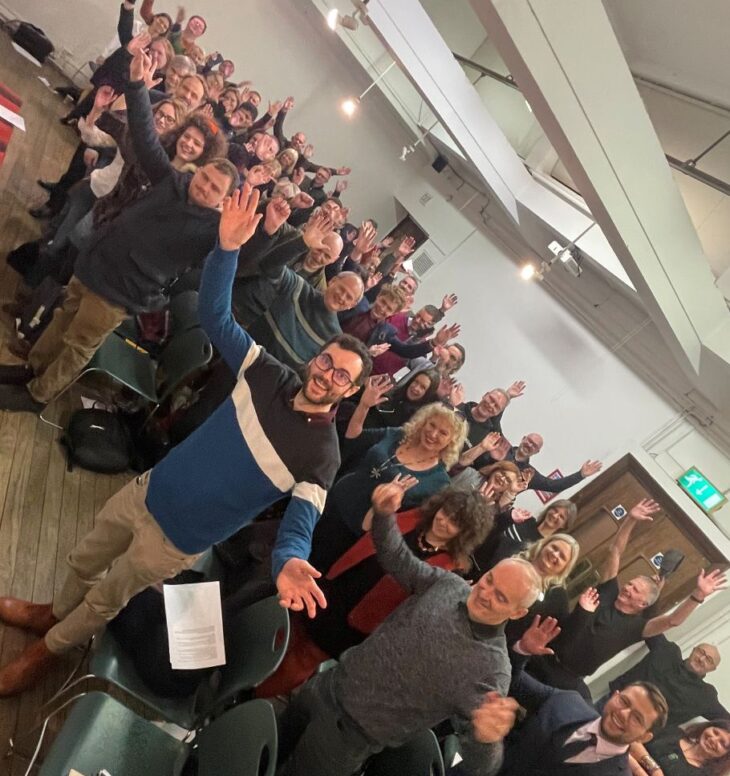
The AFAF Conference 2024 – a personal perspective
Sean Parker* gives his personal account of the Academics For Academic Freedom Conference held at Conway Hall, London, 23 November 2024.
“If you were an astronaut, would people ask you if you felt space exploration was important? So why do people ask academics whether they think academic freedom is important?”
Thus spake Dr Tim Crowley, associate professor of philosophy at University College Dublin and convenor of Dublin Universities Academics For Academic Freedom, at this year’s AFAF conference at Conway Hall in central London. Conway Hall has a proud history of hosting events on free speech and humanist thought, including George Orwell speaking there on the freedom of the press in 1945.
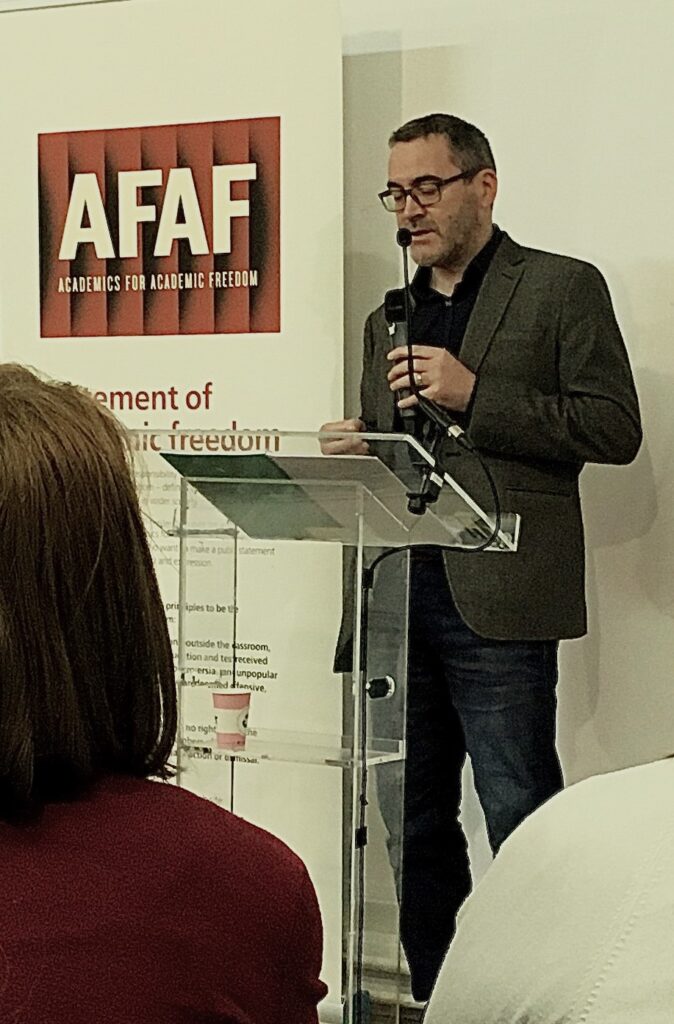
Met with a great deal of cathartic laughter, Dr Crowley’s exasperation over the cognitive dissonance in talking about academic freedom amongst academics themselves was an underlying theme of this year’s conference. Student Academics For Academic Freedom – SAFAF – was also in bold front-facing attendance, their representatives Heather McKee and Maeve Halligan giving forthright testimonies on the intense pressure felt by students due to groupthink at student unions and elsewhere.
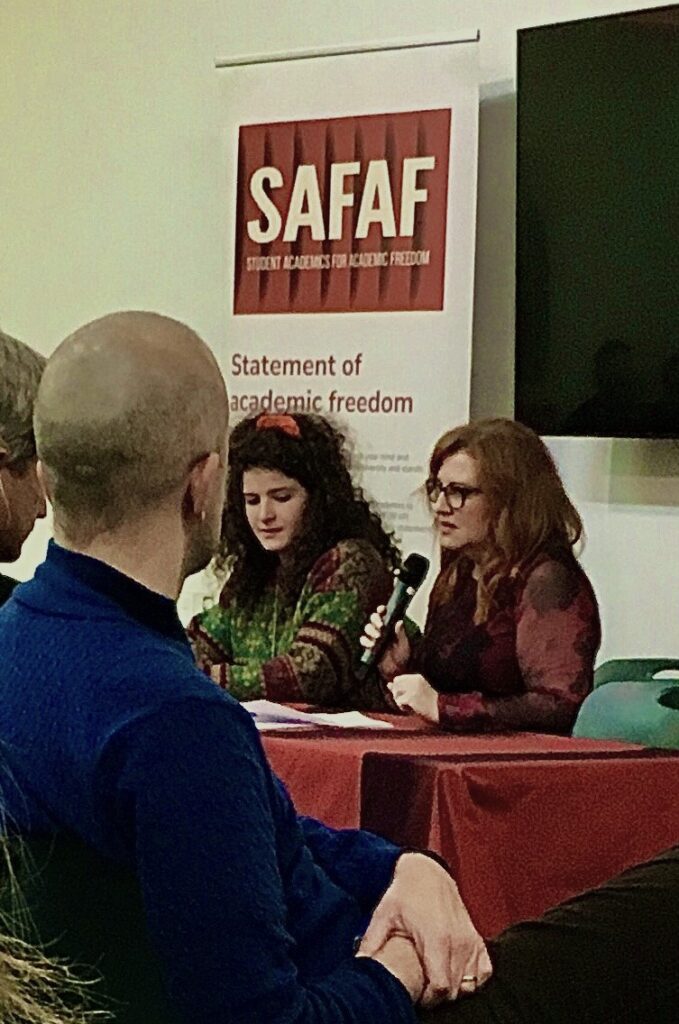
In a private session, another representative of SAFAF, Connie Shaw, received what amounted to a standing ovation following her heartfelt, intense presentation, after her gender critical podcast was branded ‘far right’ and cancelled by Leeds’ Student Union. Connie was told she could be ‘encouraging a culture of hate as a result of her social media posts’, and paid the price for the unforgivable sin of sticking to her views in 21st century academia.
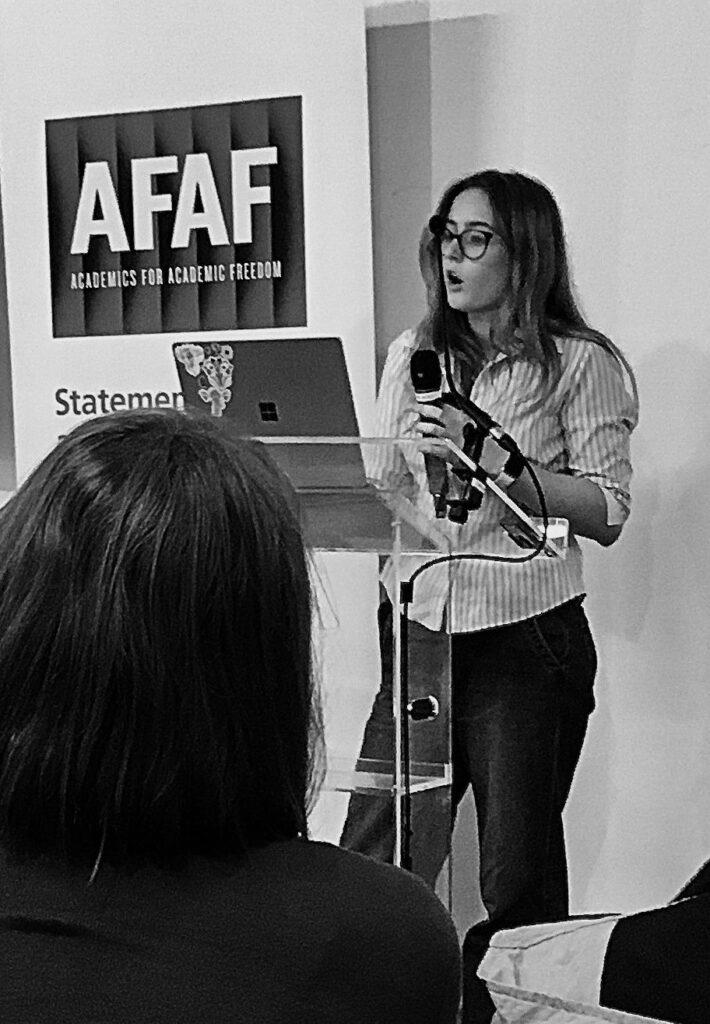
Even after the Maya Forstater win, the WPATH files, the Cass Review and Donald Trump’s election success, still the trans industry forms its own strange narratives. The gender-critical side were however on hand at Conway Hall to present some stark realities.
Professor Jo Phoenix, Professor Cordelia Fine and Dr Shereen Benjamin formed a panel to present on the natures of their respective censorships, ostracisations and cancellations, and James Esses of Thoughtful Therapists echoed them with another well-received observation. In response to a bizarre advert emanating from trans rights activists on their highlighting being mindful of biological men having periods: ‘I haven’t had my period yet’ said James, ‘I think I might be pregnant.’
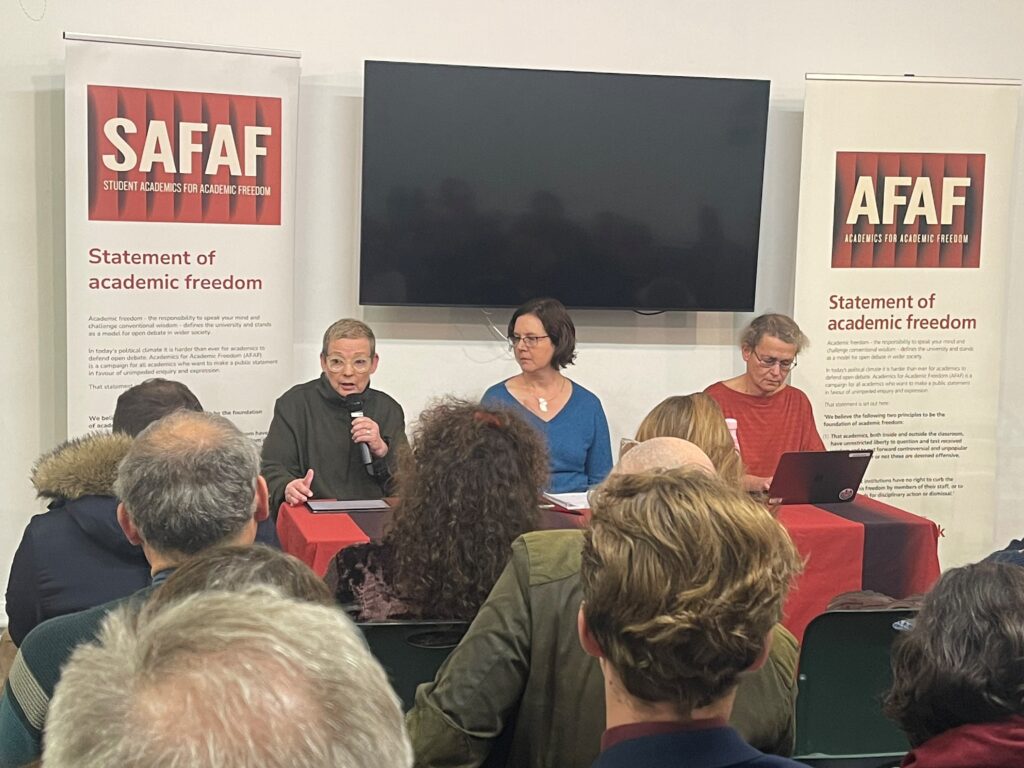
AFAF director Dennis Hayes made sure all the UK nations were represented, with Shereen Benjamin being joined by Carlton Brick and Neil Thin giving representations from the original AFAF branch, Edinburgh and the newest Branch – the University of the West of Scotland. As Brick (UWS) pointed out, the forces of cancellation ‘Intimidate through kindness.’
Thomas Prosser from the University of Cardiff and Catrin Thomas of Free Speech Wales also spoke, with Prosser: “All you need to do is repeat the name Toby Young three times to these people’ to ensure group derision; and Thomas: “We used to say “It’s a free country”. Now we say, “Are we allowed to say that?”
Abhishek Saha from Queen Mary University of London delivered an excellent timeline of HEFOSA – the Higher Education (Freedom of Speech) Act – from its Conservative inception in 2019 to Labour’s repeal just weeks into their win in 2024. Why did Bridget Phillipson do this? Pressure from Keir Starmer? Pressure from China? A combination of the two? Whichever, the Free Speech Union is suing, and the judicial review will be heard on 23rd January 2025.
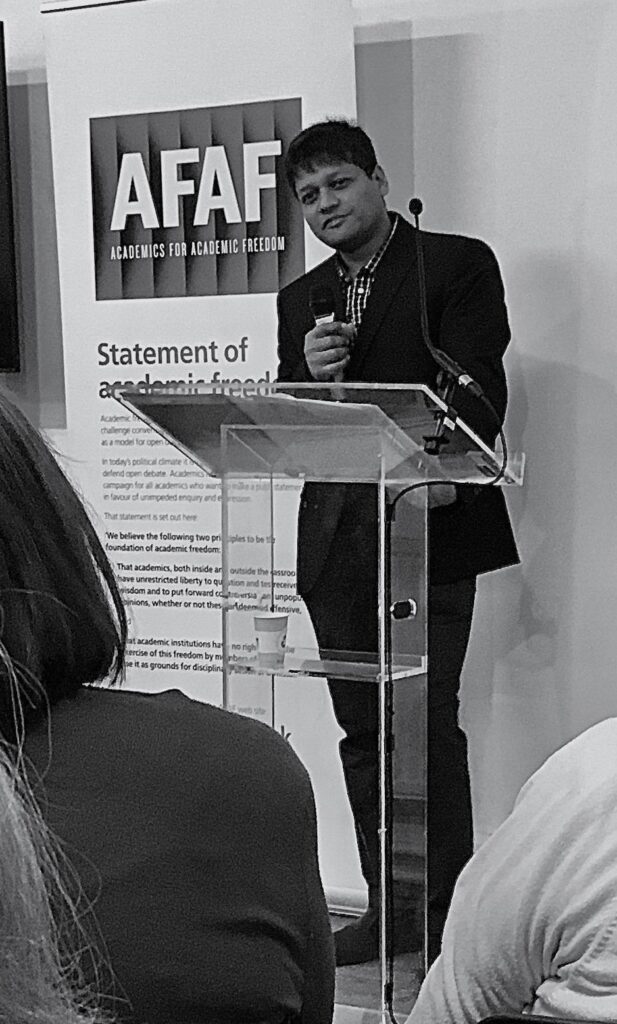
Speaking of China, Michelle Shipworth from UCL gave a clear and impassioned presentation over the impossibility of delivering facts to a cohort when the country funding their education looms like a phantom at the back of the lecture theatre. In the ‘Short Bites’ section Alastair Donald of Ideas Matter discussed Living Freedom and the importance of the work continually being done by Baroness Claire Fox and the Academy of Ideas.
Voices from around the world – but somehow facing resistance in the home of the Enlightenment – included Diane McAdie of UK Column, a librarian who protested against having to use ‘person-first’ language in her indexing work; Almut Gadow, lecturer in law from the Open University; and Daniel de Silveira from free speech outlier the University of Buckingham: “I’ve become known as the far-right free speech guy”.
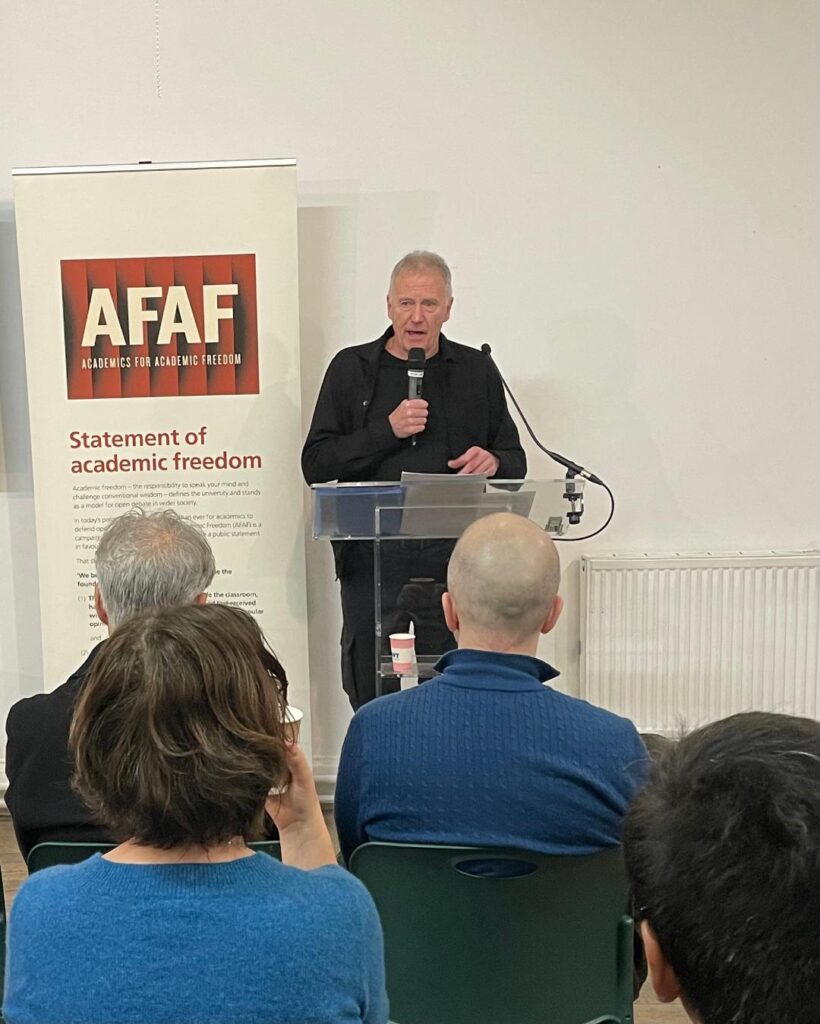
As Professor Dennis Hayes said in his introduction, ‘AFAF is expanding, quickly.’ It is no surprise when the new government overturns a Lords-approved free speech act, imprisons citizens for social media posts, and its members attempt to ‘summon’ Elon Musk to explain his actions. The case of Telegraph journalist Allison Pearson was in front of everyone’s minds, visited by police over a year-old social media post for ‘stirring up racial hatred’ – but not told which post nor the name of the ‘victim’ who reported it.
At the 2023 AFAF conference at City University a comment was made: “We need more students, more young people”. This has been achieved, with the mushrooming SAFAF. True diversity of thought, age, background, and viewpoint were gathered at Conway Hall. The lawyers, editors, charity workers and almost all other professionals of the UK’s future will have passed through the higher education system. It is vital that these students see academic freedom – the freedom to ask, to discuss, to at least be aware – is as paramount a freedom as Tim Crowley’s pondering astronautics; or indeed Elon Musk wondering how he can one day populate Mars.
*Sean Bw Parker (MA) is an artist, writer and contributing editor to Empowering The Innocent, a justice reform organisation affiliated with the University of Bristol Law School
(Photo Credits: Sean Parker)

